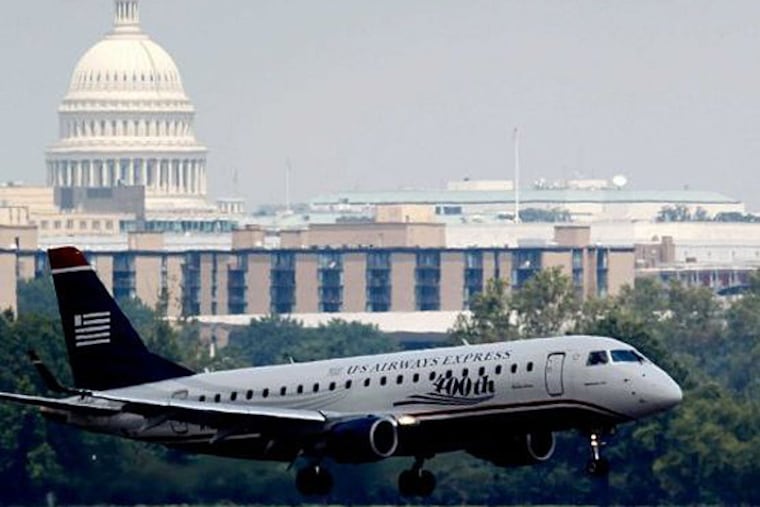Congress up in the air about losing nonstop flights

More than 100 members of Congress are upset that nonstop flights out of a Washington, D.C., airport to their hometowns could be a thing of the past, which they say isn't fair to smaller communities.
The flight flap involves the merger of American Airlines and US Airways, and the chance that government regulators will force the new company to drop flights to duplicate routes at Ronald Reagan National Airport.
Reagan National is one of the few airports with direct federal government oversight of its flight routes. For example, one rule from 1966 limits the number of longer-distance flights from Reagan, and changes need to be approved annually by Congress.
The lawmakers say their primary concern is the economic impact the moves would have on small- and medium-sized destination cities.
But critics say the politicians are part of the new "Commuter Congress" that flies into the capital on Monday and leaves before the start of the weekend to go home.
The Congress members signed a petition in late May asking Transportation Secretary Ray LaHood and Attorney General Eric Holder to keep all the current US Airways and American Airlines flight routes out of Reagan.
Rep. Mike Michaud, a Maine Democrat, is spearheading the petition. Michaud travels to Bangor, which is served by direct US Airways flights from Reagan National.
"Other airlines lack the necessary connectivity out of Reagan National and would be more likely to transfer any divested slots to larger cities and more lucrative routes," the lawmakers wrote in the letter, which was dated May 28.
The Justice Department could request divestitures, as part of the merger, of some of the US Airways and American Airlines routes at Reagan National and other airports.
Politico had an extensive profile of the plane battle on Monday, which said Reagan National customers could lose access to nonstop flights to Augusta, Georgia; Tallahassee, Florida; Fayetteville, Arkansas; Charleston, West Virginia; and Hilton Head, South Carolina. Flights would still be available to smaller cities through connecting hub airports.
"This letter has absolutely nothing to do with lawmakers' convenience and everything to do with representing the smaller communities that realize the economic benefits of these flights," Michaud said on Friday. "We heard from our communities on this issue and responded in a bipartisan way. There's really nothing else to it, and I've been disappointed with efforts in the media to misconstrue the intent of this letter."
Rival airlines Southwest Airlines and JetBlue are hoping the combined US Airways–American Airlines will be forced to drop some routes, so they can get access to Reagan National customers and fly to popular destinations.
A sticking point could be that a combined US Airways–American Airlines would control almost 70 percent of the flights out of Reagan National, if it's not forced to divest some routes, Politico said.
Ultimately, the decision about the flights will be up to LaHood and Holder.
In Senate testimony in March, US Airways CEO Doug Parker said the combined airline would allow customers from smaller cities to connect to more flights. He said that smaller communities would lose flights if the routes at Reagan National went to other airlines that would use the slots to fly to bigger cities.
"We don't believe it would be good for consumers to divest any slots," Parker said.
At the March hearings, Senate Republican Mike Lee said it wasn't government's role to determine where airlines flew and how often.
"Government may sometimes have a proper role in ensuring that a company does not obtain undue market power," he said. "But it's improper … for federal agencies to pick winners and losers in the marketplace and, absent evidence that a transaction will substantially reduce competition and thereby harm consumers, I believe government intervention is usually unwarranted," said Lee.